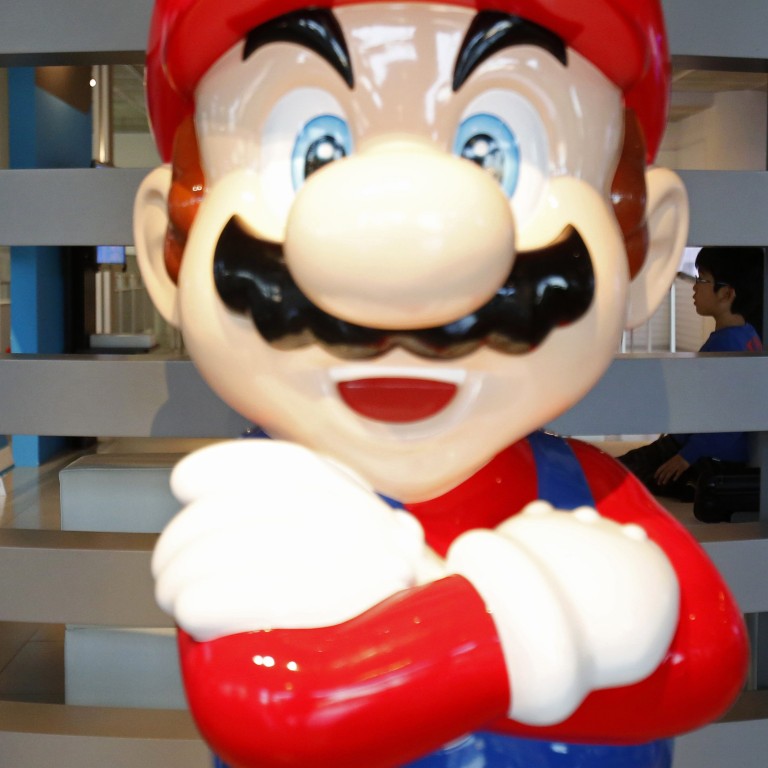
Nintendo shares fall as hard-hit firm sticks with consoles
President takes pay-cut and slashes forecasts but stands by gaming consoles as shares in the company nosedive
Nintendo shares fell more than three per cent on Thursday morning as the struggling Japanese videogames giant said it would stick to its hard-hit console business despite slumping Wii U sales.
Wild moves in the embattled stock -- it jumped more than seven per cent before nosediving by the break -- come after the company late Wednesday announced a share buyback plan and a pay cut for its president, following a dive in earnings.
On Thursday, Nintendo President Satoru Iwata told a Tokyo analyst conference that the company had no intention of abandoning its console-centric business, despite the rising threat posed by cheap, downloadable games for mobiles.
Nintendo has faced hard questions over its longtime refusal to broadly license some of its iconic brands, including Super Mario and Donkey Kong, and jump directly into the digital games business.
“The...business integrating hardware and software is our strength,” Iwata said.
Nintendo did not have the weight to make a splash in the hyper-competitive digital games sector, he said.
“We don’t have that kind of strength given the size of our business,” Iwata said.
Nintendo would, however, look at loosening its licensing policy to promote some of its iconic characters on smartphones and other mobile devices.
“In the past we were negative about licensing business. But we’ll change this policy and be proactive including looking for a possible business partner,” Iwata said.
The vague outline, which also included a reference to entering the lucrative healthcare market, did not impress shareholders who pushed down the Tokyo-listed stock by 3.49 per cent to 12,430 yen (HK$939.7) at the break.
“Players’ sentiment reversed sharply immediately after Nintendo’s news,” said Kenzaburo Suwa, strategist at Okasan Securities.
“The market had expected something new related to smartphone businesses, but the results just disappointed the market.”
The comments from Iwata, who said Wednesday he would draw a reduced salary for five months to atone for the downturn, comes just over a week after the Kyoto-based company shocked investors by warning it expects to slip back into the red in the year to March.
It also slashed its Wii U sales forecast owing to weaker-than-expected holiday season demand.
Analysts have criticised the system’s limited game selection, as rivals Sony and Microsoft enjoy robust demand for their new PlayStation 4 and Xbox One consoles, even as they also battle the trend toward mobile games.
On Wednesday Nintendo said it earned 10.20 billion yen in the nine months to December as revenue fell 8.1 per cent to 499.12 billion yen. It also reported a 1.58 billion yen operating loss.
To help shore up its embattled stock, Nintendo also announced it would buy back nearly 8.0 per cent of its outstanding shares.
The company has warned that warned it would make a loss this fiscal year and sell just 2.8 million units of the Wii U worldwide.

That is less than a third of its earlier forecast for 9.0 million consoles, and deals a blow to its hopes of matching the blockbuster success of the original Wii. Nintendo launched the Wii U in late 2012.
By contrast, Sony had sold more than 4.2 million PlayStation 4 consoles by the start of this year, less than two months after its release.
Nintendo’s grim forecast is especially disappointing for a company that scratched its way back to profitability last year thanks to a sharply weaker yen, which inflates Japanese firms’ repatriated profits.
It has previously blamed weak earnings partly on high development and marketing costs for the Wii U, launched in late 2012, although sales of its 3DS handheld console and related game titles fared better. It cut prices on both consoles to boost sales.
